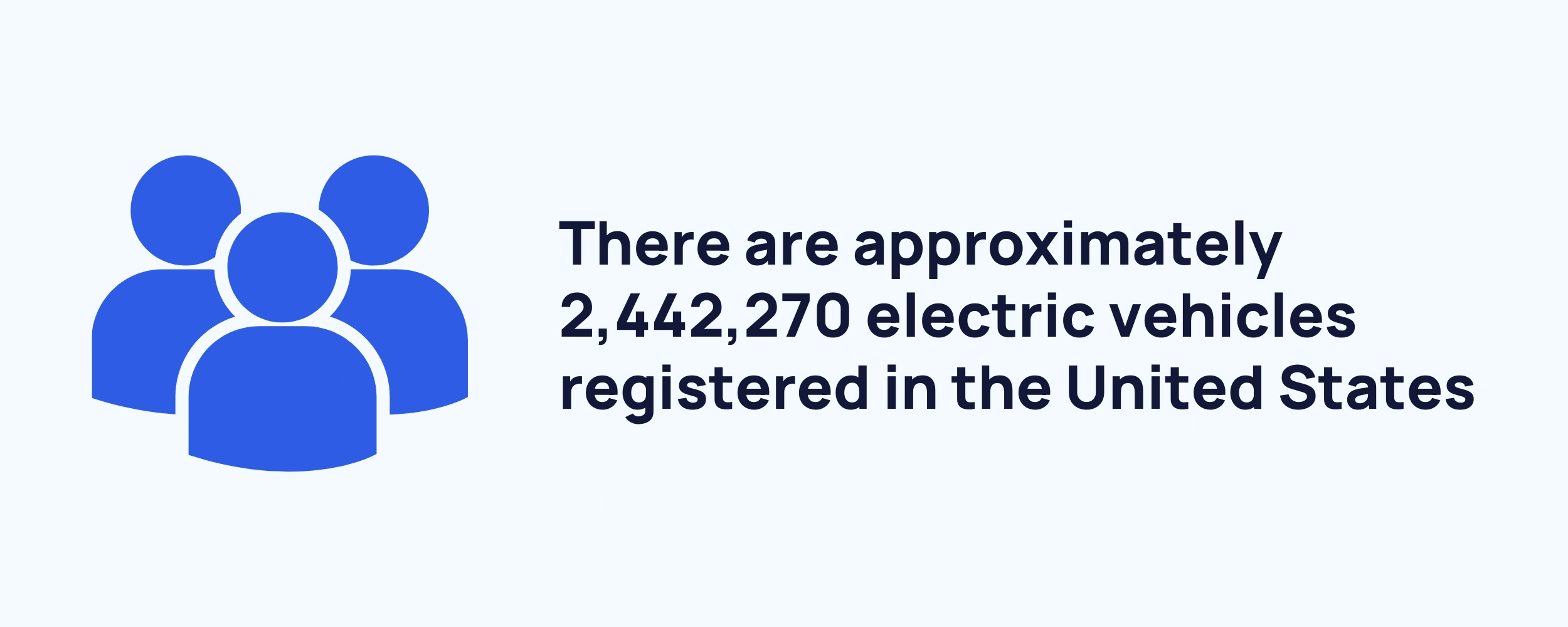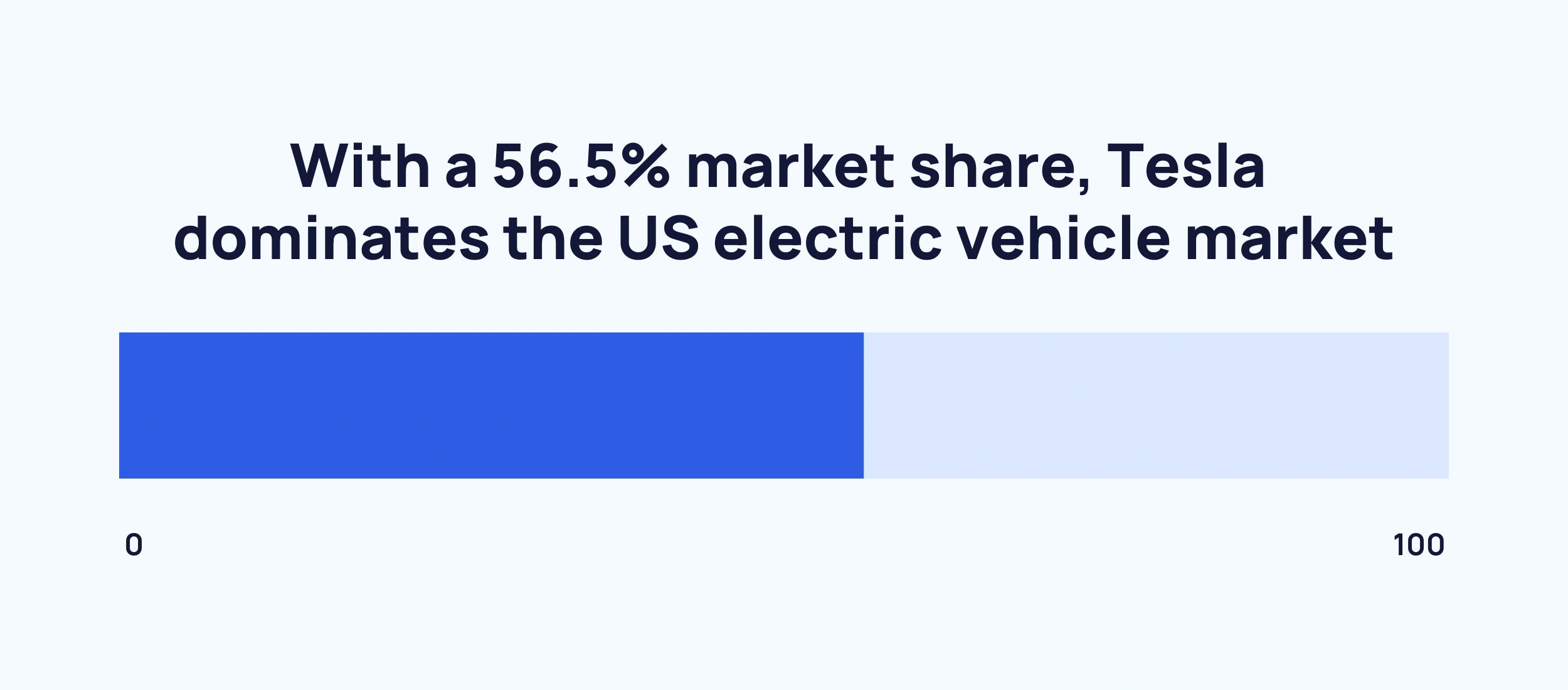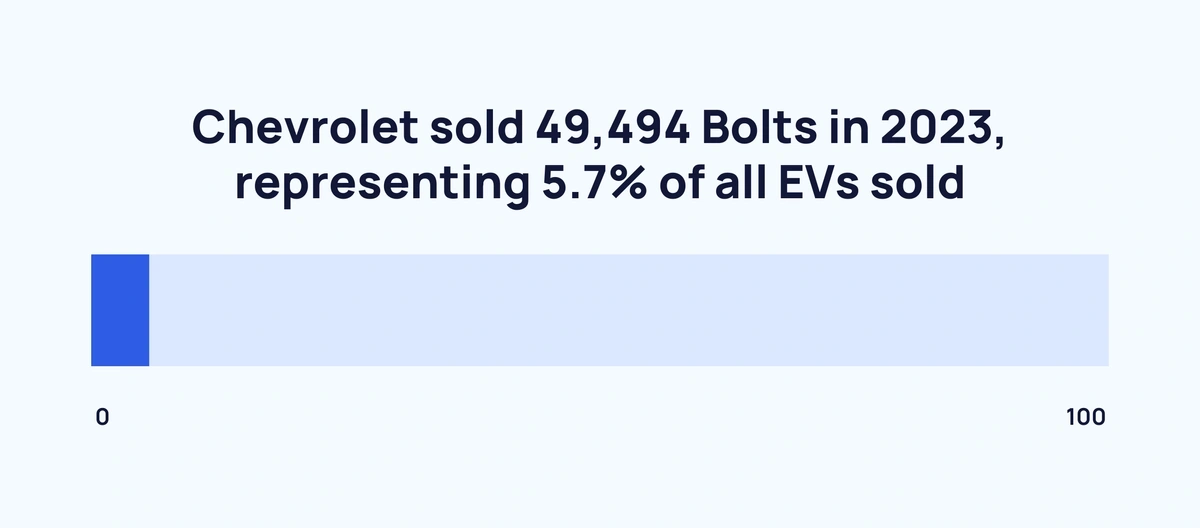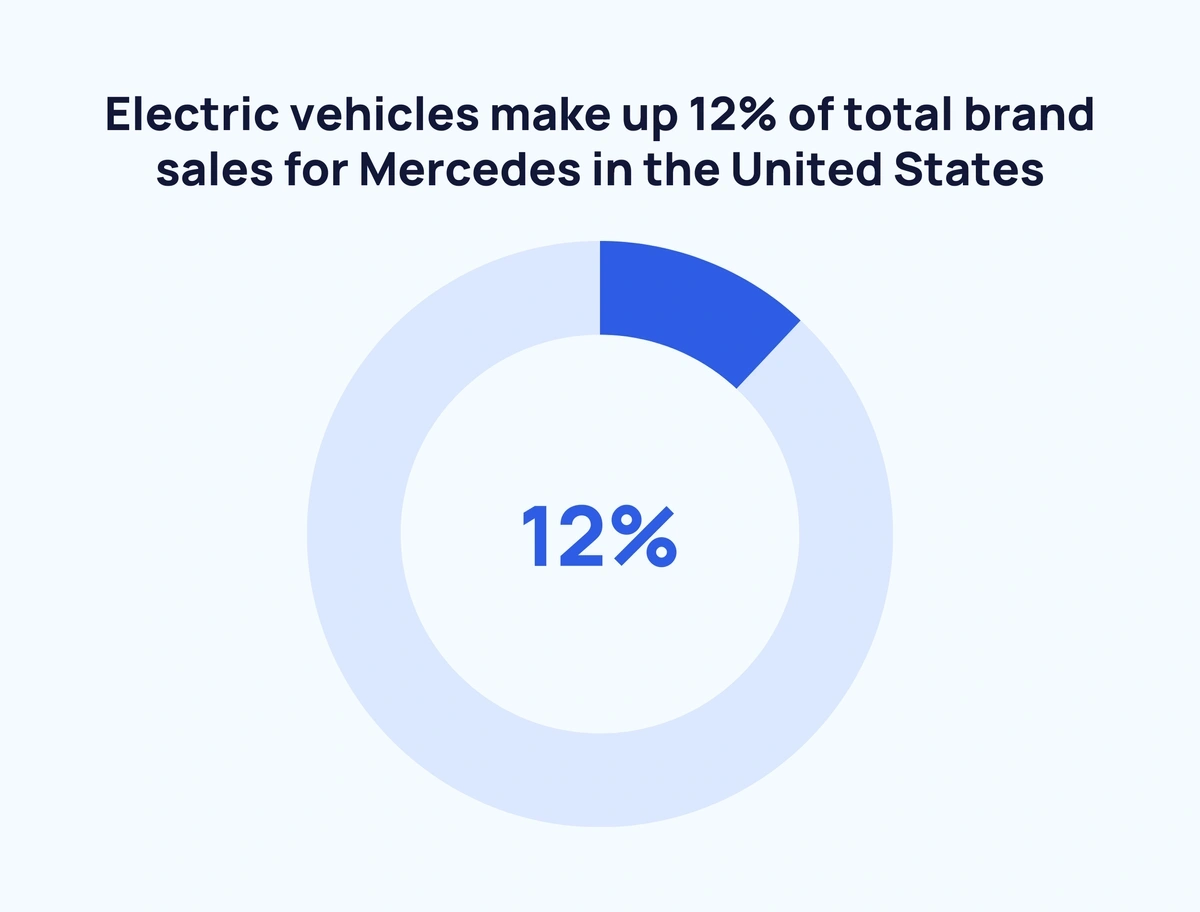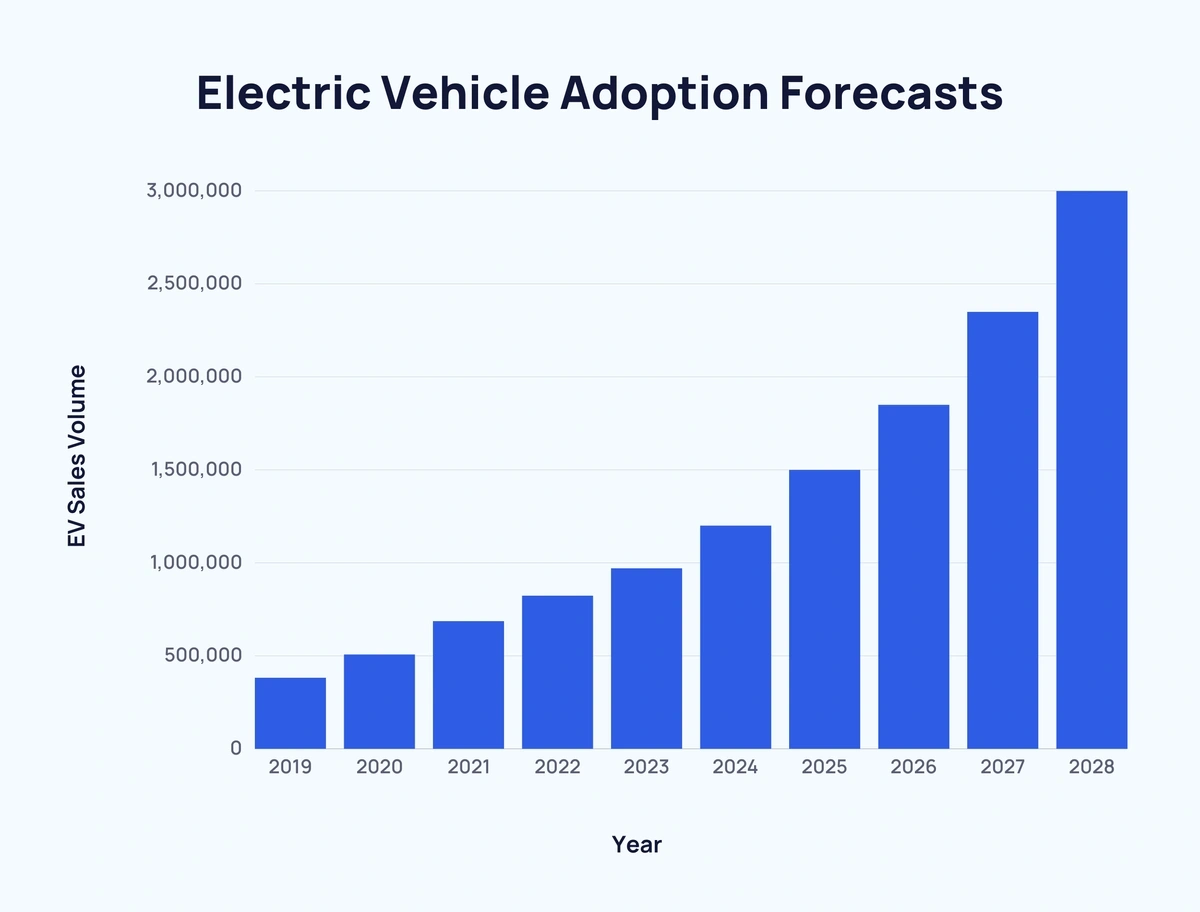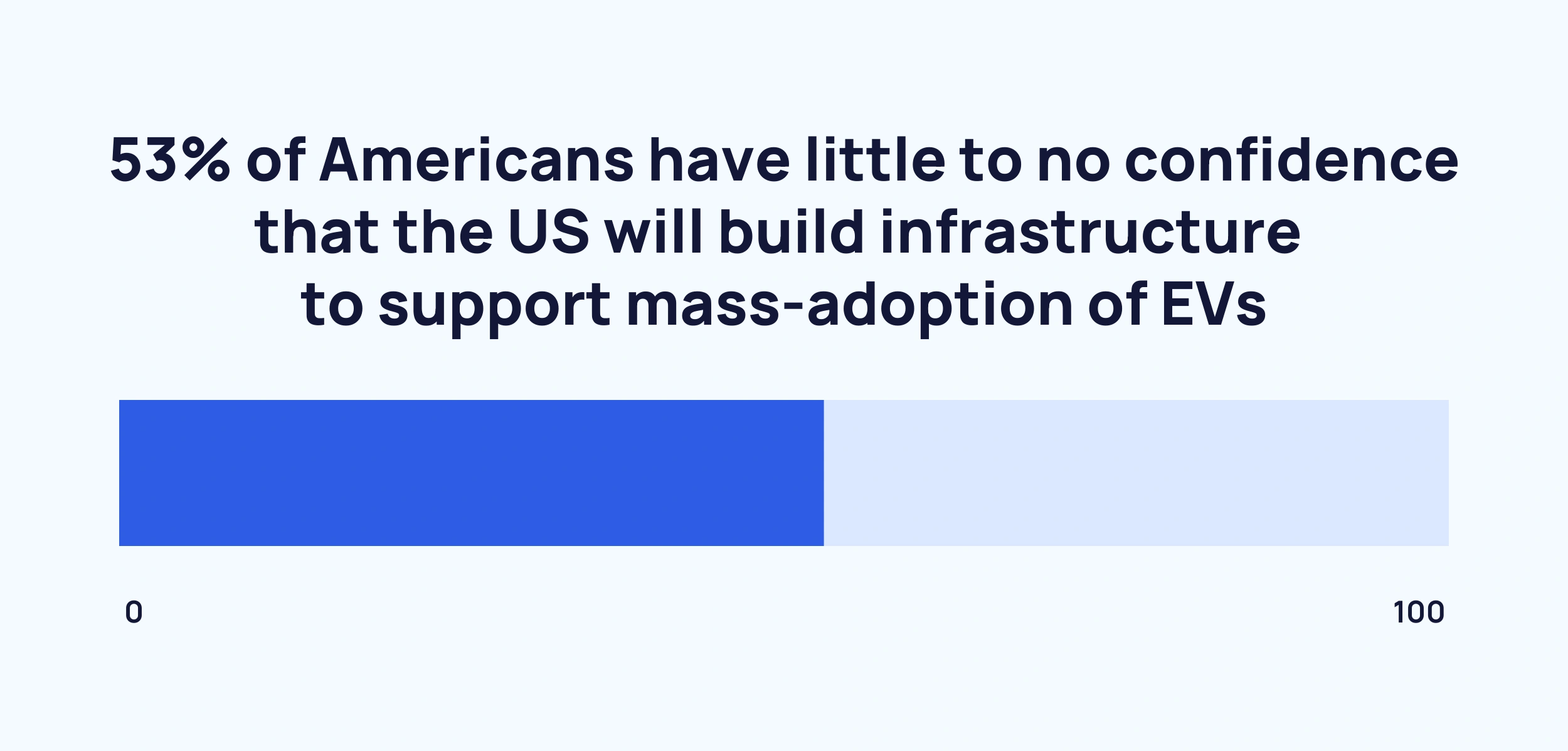Get Advanced Insights on Any Topic
Discover Trends 12+ Months Before Everyone Else
How We Find Trends Before They Take Off
Exploding Topics’ advanced algorithm monitors millions of unstructured data points to spot trends early on.

Keyword Research
Performance Tracking
Competitor Intelligence
Fix Your Site’s SEO Issues in 30 Seconds
Find technical issues blocking search visibility. Get prioritized, actionable fixes in seconds.
Powered by data from
How Many Electric Vehicles Are in the United States? (2024)
When the first modern electric car hit the market in 2010, consumers had an exciting, eco-friendly new option for their commute.
Electric vehicles (EVs) have become more prevalent on the streets and highways of the United States every year since.
How popular are electric cars with Americans right now? We’ll dive into that, plus other interesting data, statistics and trends about the overall EV market in the US.
Contents
- Top Electric Vehicle Stats (2024)
- Number Of Electric Vehicles In The United States
- Electric Vehicle US Market Share
- Electric Vehicle Adoption Forecasts
- US Electric Vehicle Market Size (2023-2032)
- American Consumer Opinions On EVs
Top Electric Vehicle Stats (2024)
Here are five notable facts to keep in mind about electric vehicles:
- There are currently 2,442,270 electric vehicles registered in the United States.
- California has the highest EV adoption rate (2.5%).
- Tesla has a 56.5% market share for EVs sold in the United States.
- The US electric vehicle market was valued at $49.1 billion in 2023.
- 38% of US adults would consider an EV for their next vehicle purchase.
Keep reading for even more electric vehicle trends and statistics.
Number of Electric Vehicles in the United States
According to the latest available data, there are approximately 2,442,270 electric vehicles registered in the United States.
Perhaps notably, over one-third (36%) of EVs are registered in the State of California.
With over 900,000 electric vehicles, California also has the highest EV adoption rate: 1 in 50 registered vehicles in California is electric.
Other states with (relatively) high rates of electric vehicle ownership are the District of Columbia, Hawaii, Washington, and Nevada.
States with the lowest EV adoption rates include North Dakota, Mississippi, Wyoming, South Dakota, and West Virginia.
Here’s a full breakdown of electric vehicle registrations in the United States:
| State | Registered EVs | % of All Registered Vehicles |
| Alabama |
8,730 |
0.18% |
| Alaska |
1,970 |
0.36% |
| Arizona |
65,780 |
1.01% |
| Arkansas |
5,140 |
0.19% |
| California |
903,620 |
2.50% |
| Colorado |
59,910 |
1.11% |
| Connecticut |
22,030 |
0.75% |
| Delaware |
5,390 |
0.59% |
| District of Columbia |
5,860 |
1.85% |
| Florida |
167,990 |
0.93% |
| Georgia |
60,120 |
0.63% |
| Hawaii |
19,760 |
1.83% |
| Idaho |
5,940 |
0.31% |
| Illinois |
66,880 |
0.67% |
| Indiana |
17,710 |
0.29% |
| Iowa |
6,220 |
0.20% |
| Kansas |
7,550 |
0.29% |
| Kentucky |
7,560 |
0.19% |
| Louisiana |
5,880 |
0.16% |
| Maine |
4,990 |
0.41% |
| Maryland |
46,060 |
0.91% |
| Massachusetts |
49,440 |
0.91% |
| Michigan |
33,150 |
0.39% |
| Minnesota |
24,330 |
0.48% |
| Mississippi |
2,420 |
0.09% |
| Missouri |
17,870 |
0.33% |
| Montana |
3,260 |
0.33% |
| Nebraska |
4,570 |
0.24% |
| Nevada |
32,950 |
1.31% |
| New Hampshire |
6,990 |
0.51% |
| New Jersey |
87,030 |
1.22% |
| New Mexico |
7,080 |
0.37% |
| New York |
84,670 |
0.75% |
| North Carolina |
45,590 |
0.51% |
| North Dakota |
640 |
0.08% |
| Ohio |
34,060 |
0.33% |
| Oklahoma |
16,290 |
0.38% |
| Oregon |
46,980 |
1.24% |
| Pennsylvania |
47,440 |
0.47% |
| Rhode Island |
4,340 |
0.49% |
| South Carolina |
13,490 |
0.27% |
| South Dakota |
1,170 |
0.13% |
| Tennessee |
22,040 |
0.34% |
| Texas |
149,000 |
0.59% |
| Utah |
28,050 |
0.93% |
| Vermont |
5,260 |
0.89% |
| Virginia |
56,610 |
0.74% |
| Washington |
104,050 |
1.53% |
| West Virginia |
1,870 |
0.13% |
| Wisconsin |
15,700 |
0.29% |
| Wyoming |
840 |
0.12% |
| Total |
2,442,270 |
0.86% |
The data shows that overall EV adoption is fairly low in the United States: only 0.86% of registered vehicles are electric.
43 states have adoption rates below 1%, and two states—North Dakota and Mississippi—have adoption rates lower than 1 in 1000.
Source: AFDC
Electric Vehicle US Market Share
27 automakers sold electric vehicles to US consumers in 2023, but one of those companies is clearly leading the pack in the EV market: Tesla.
In fact, Tesla accounted for 56% of electric vehicles through the first nine months of 2023.
(That’s 493,513 out of 873,082 EVs sold).
However, there’s evidence that Tesla’s lead in the market might be shrinking.
Tesla had a 66.5% share of EV sales in 2022, meaning its share shrunk by over 15% in a single year.
Here’s a breakdown of the number of electric vehicles sold by each automaker through the first three quarters of 2023:
| Brand | 2023 Sales (Units) | 2023 Market Share |
| Audi | 17628 | 2.02% |
| BMW | 31043 | 3.56% |
| Brightdrop | 333 | 0.04% |
| Cadillac | 5334 | 0.61% |
| Chevrolet | 49531 | 5.67% |
| Ford | 46671 | 5.35% |
| Genesis | 4361 | 0.50% |
| GMC | 1216 | 0.14% |
| Fisker | 997 | 0.11% |
| Hyundai | 41296 | 4.73% |
| Jaguar | 219 | 0.03% |
| Kia | 22891 | 2.62% |
| Lexus | 2511 | 0.29% |
| Lucid | 4588 | 0.53% |
| Mazda | 100 | 0.01% |
| Mercedes | 29686 | 3.40% |
| Mini | 1780 | 0.20% |
| NIssan | 15503 | 1.78% |
| Polestar | 8887 | 1.02% |
| Porsche | 5212 | 0.60% |
| Rivian | 36636 | 4.20% |
| Subaru | 5763 | 0.66% |
| Tesla | 493513 | 56.53% |
| Toyota | 6486 | 0.74% |
| Vinfast | 2009 | 0.23% |
| Volvo | 11733 | 1.34% |
| VW | 27155 | 3.11% |
Here’s a closer look at the top five EV manufacturers selling to the US market:
Tesla
With a 56.5% market share, Tesla dominates the US electric vehicle market.
The Elon Musk-led company is the only brand in the top five that exclusively manufactures electric vehicles.
Tesla’s share is actually down from what it once was—thanks to established automakers adding more EVs to their model lineups.
Tesla’s best selling EV is the Model Y, a crossover SUV that hit the market in 2020. Tesla sold 296,059 Model Ys in 2023.
Chevrolet
Chevrolet (along with Ford) is one of the oldest automakers in the United States.
Their Bolt EV hit the American market in 2017, a year in which the model was named Car of the Year by Motor Trend magazine.
Chevrolet sold 49,494 Bolts in 2023, representing 5.7% of all EVs sold.
Two other models—the Blazer EV and Silverado EV—debuted in fall 2023.
Ford
Ford has the third-most EV sales in the United States thanks to the rising popularity of the Mustang Mach-E, which won the 2021 North American SUV of the Year.
US consumers bought 28,882 Mach-Es in the first three quarters of 2023.
Ford has two additional electric vehicles in their lineup: the F-150 Lightning (12,260 units sold) and the E-Transit (5,529 units sold).
Hyundai
South Korean automaker Hyundai first entered the US EV market in 2019 with the Kona Electric and has since launched its electric Ioniq line of vehicles.
Hyundai sold 7,672 Kona Electrics in 2023.
The Ioniq line includes the Ioniq5, a crossover SUV that sold 25,306 units in 2023.
Hyundai’s midsize electric sedan—the Ioniq6—hasn’t caught on quite as well, selling 8,318 units in 2023.
Mercedes
German luxury automaker Mercedes-Benz opened its EQ line of electric vehicles in 2016.
Three of those models—the EQ B, EQ E, and EQ S—are available to US consumers.
The EQ S has been the most popular model in America with 12,720 units sold in 2023.
Electric vehicles make up 12% of total brand sales for Mercedes in the United States.
Source: Kelley Blue Book
Electric Vehicle Adoption Forecasts
In 2023, electric vehicles are expected to account for 5.7% of all auto sales in the United States, which is more than double the share of sales EVs had in 2019.
It’s a trend that’s likely to continue.
By 2028, EVs could make up over 17% of all auto sales in the US.
Here’s a breakdown of projected EV sales volume between 2019 and 2028:
| Year | EV Sales Volume | EV Sales Share |
| 2019 | 382,920 | 2.31% |
| 2020 | 507,710 | 3.04% |
| 2021 | 686,450 | 4.09% |
| 2022 | 824,050 | 4.91% |
| 2023 | 970,550 | 5.71% |
| 2024 | 1,200,000 | 7.06% |
| 2025 | 1,500,000 | 8.82% |
| 2026 | 1,850,000 | 10.88% |
| 2027 | 2,350,000 | 13.82% |
| 2028 | 3,000,000 | 17.65% |
EVAdoption considers a 16% adoption rate to be “mass adoption,” which means the US is projected to reach mass electric vehicle adoption in 2028.
California is the first state to reach mass adoption, hitting 16.2% in 2023. EVAdoption predicts a 56.6% adoption rate in California by 2030.
Source: EVAdoption
US Electric Vehicle Market Size (2023-2032)
The US electric vehicle market was valued at $49.1 billion in 2023.
The market includes fuel cell electric vehicles, battery electric vehicles, plug-in hybrid electric vehicles, and hybrid electric vehicles.
Passenger cars represent 84.6% of the market, with two-wheel and commercial vehicles making up the remaining 15.4%.
Market experts predict significant growth for EVs in the United States over the next decade.
At a 15.5% CAGR, the market could be worth $215.7 billion by 2032.
Source: Global Market Insights
American Consumer Opinions on EVs
Aside from market projects, how does the American public feel about electric vehicles?
From a 2023 Pew Research survey, just over one-third of Americans are considering an EV for their next vehicle purchase.
Age, politics, and geography are key factors in whether or not Americans would consider purchasing an EV:
| Not Considering | Considering | Hard “No” | |
| All US Adults | 50% | 38% | 13% |
| Age 18-29 | 34% | 48% | 18% |
| Age 30-49 | 47% | 42% | 10% |
| Age 50-64 | 56% | 33% | 10% |
| Age 65+ | 59% | 27% | 14% |
| Republican | 70% | 20% | 10% |
| Democrat | 30% | 56% | 13% |
| Urban | 36% | 48% | 16% |
| Suburban | 48% | 40% | 12% |
| Rural | 65% | 24% | 11% |
Surveys reveal that infrastructure concerns could also be holding Americans back from wanting to adopt electric vehicles.
53% of Americans have little to no confidence that the US will build infrastructure to support mass-adoption of EVs.
59% of US adults also say they oppose a plan to phase out gasoline-powered vehicles by 2035, and 45% say they would be upset if the US stopped manufacturing gasoline-powered vehicles.
Source: Pew Research
Wrap Up
Electric vehicles are still a niche market for most of the United States, with EVs making up less than 1% of registered vehicles in the majority of US states.
Still, the market is poised for substantial growth, and the US could see mass-adoption (16% of adult drivers) of electric vehicles by the end of the decade.
While many Americans are hesitant to leave behind gas-powered cars, expansion of infrastructure through more charging stations could convince some to switch to EVs.
For more insights on electric vehicles, infrastructure, and emerging transportation technology, read our report on the Future of Transportation.
Stop Guessing, Start Growing 🚀
Use real-time topic data to create content that resonates and brings results.
Exploding Topics is owned by Semrush. Our mission is to provide accurate data and expert insights on emerging trends. Unless otherwise noted, this page’s content was written by either an employee or a paid contractor of Semrush Inc.
Share
Newsletter Signup
By clicking “Subscribe” you agree to Semrush Privacy Policy and consent to Semrush using your contact data for newsletter purposes
Written By


Josh is the Co-Founder and CTO of Exploding Topics. Josh has led Exploding Topics product development from the first line of co... Read more




